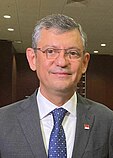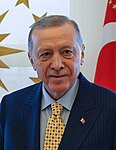You can help expand this article with text translated from the corresponding article in Turkish. (February 2024) Click [show] for important translation instructions.
|
| |||||||||||||||||||||||||||||||||||||||||||||||||||||||||||||||||||||||||||||||||||||||||||||
All 81 Provinces of Turkey 30 metropolitan, 922 district and 398 town municipal mayors 1,282 provincial and 21,001 municipal councillors | |||||||||||||||||||||||||||||||||||||||||||||||||||||||||||||||||||||||||||||||||||||||||||||
|---|---|---|---|---|---|---|---|---|---|---|---|---|---|---|---|---|---|---|---|---|---|---|---|---|---|---|---|---|---|---|---|---|---|---|---|---|---|---|---|---|---|---|---|---|---|---|---|---|---|---|---|---|---|---|---|---|---|---|---|---|---|---|---|---|---|---|---|---|---|---|---|---|---|---|---|---|---|---|---|---|---|---|---|---|---|---|---|---|---|---|---|---|---|
| Opinion polls | |||||||||||||||||||||||||||||||||||||||||||||||||||||||||||||||||||||||||||||||||||||||||||||
| Turnout | 78.11% ( | ||||||||||||||||||||||||||||||||||||||||||||||||||||||||||||||||||||||||||||||||||||||||||||
| |||||||||||||||||||||||||||||||||||||||||||||||||||||||||||||||||||||||||||||||||||||||||||||
Local elections in Turkey took place throughout the country's 81 provinces on 31 March 2024.[1] A total of 30 metropolitan and 1,363 district municipal mayors, alongside 1,282 provincial and 21,001 municipal councilors were elected, in addition to numerous local non-partisan positions such as neighborhood representatives (muhtars) and elderly people's councils.
The elections took place ten months after the 2023 parliamentary and presidential elections, where the Nation Alliance opposition coalition suffered an unexpected narrow defeat to President Recep Tayyip Erdoğan's governing People's Alliance. This was despite an ongoing economic crisis and rapidly rising inflation. Following the defeat, the opposition six-party coalition dissolved, with the main opposition parties Republican People's Party (CHP) and Good Party (İYİ) fielding separate candidates for effectively all mayoral positions. This was the first nationwide election to be contested by the CHP's new leader Özgür Özel, who had successfully challenged his predecessor Kemal Kılıçdaroğlu for the position in November 2023.
The Peoples' Equality and Democracy Party (DEM), which succeeded the Peoples' Democratic Party (HDP) as Turkey's principal Kurdish minority rights party, fielded its own candidates in many western metropoles, despite having previously withdrawn candidates in favor of the Nation Alliance.
The results were described as a "spectacular upset" victory for the opposition CHP,[2] which despite the lack of any electoral pacts managed to retain all but one of its metropolitan mayoralties, while winning four more. In particular, the party's candidates in Turkey's largest city Istanbul and capital Ankara, Ekrem İmamoğlu and Mansur Yavaş, were re-elected by landslide 51% and 60%, respectively. Both mayors also won majorities in their respective metropolitan councils, giving them significantly more powers than their previous terms, and are now seen as potential presidential contenders for the next Turkish presidential election.[citation needed] The CHP also won many unexpected victories in areas that had been under government control for the previous two decades, including Bursa, Balıkesir, Manisa, Kütahya, Adıyaman, Amasya, Kırıkkale, Kilis and Denizli. The party also managed to win swathes of districts within many provinces, many of which delivered vote swings of over 30% in the CHP's favor. Overall, the CHP won 35 of Turkey's 81 provincial capitals, with the People's Alliance winning 32.[3]
This was the first nationwide election since 1977 where the CHP came first in the popular vote, and the first election where the AK Party did not come first since its foundation in 2001. Nevertheless, the AK Party retained a narrow plurality in the number of district mayoralties won, and the People's Alliance scored small but notable victories against the CHP in Hatay and Kırklareli. The leader of the opposition Good Party (İYİ), Meral Akşener, announced her pending resignation after her party almost halved its share of the popular vote.[4]
Cite error: There are <ref group=lower-alpha> tags or {{efn}} templates on this page, but the references will not show without a {{reflist|group=lower-alpha}} template or {{notelist}} template (see the help page).
- ^ Alper Coşkun (1 June 2023). "Erdoğan's Next Fight". Carnegie Endowment for International Peace. Archived from the original on 4 June 2023. Retrieved 10 November 2023.
- ^ "Turkey's President Recep Tayyip Erdogan suffers an electoral disaster". The Economist. Archived from the original on 1 April 2024. Retrieved 1 April 2024.
- ^ "Seçim 2024". Anadolu Agency. Archived from the original on 14 May 2023. Retrieved 2 April 2024.
- ^ "Archived copy". Archived from the original on 9 April 2024. Retrieved 9 April 2024.
{{cite web}}: CS1 maint: archived copy as title (link)







